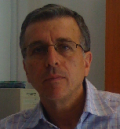Let us introduce you the lecturers’ part of our past and actual Summer School:
Raul Caruso
Prof. Raul Caruso, educated in Naples (MA), Leuven (Msc) and Milan (PhD), is currently affiliated at the Catholic University of the Sacred Heart where he is professor of Peace economics, International Economics and Economics of Crime. He is editor in chief of Peace Economics, Peace Science and Public Policy (USA) and he is also in the editorial board of Defence and Peace Economics (USA), the Economics of Peace and security Journal (USA), RivistaInternazionale di ScienzeSociali (Italy). He is Director of CESPIC (European Centre of Peace Science Integraiton and Cooperation) at the Caholic University 'Our Lady of Good Counsel'. There he is also serving as Rector’s delegate to International Relations. He has served as executive director of Network of European Peace Scientists (2009 - 2019) and he is head of the Italian Chapter of Economists for Peace and Security. He is also member of the scientific committees of Center for Applied Economics (CSEA) and Center for Higher Education Internationalization (CHEI) at the Catholic University of the Sacred Heart. There he is the representative within the Italian Network of University for Peace.
Arzu Kibris
Prof. Arzu Kibris received her PhD in Political Science in 2010. In January 2017 joined the University of Warwick as Associated Professor, before she worked as a visiting Assistant Professor at Duke University and as Assistant Professor at Sabancı University, Istanbul. Her main research interests include the dynamics and social, political, and economic consequences of civil conflicts as well as formal analyses of political and economic behavior. Her work has been published in the Journal of Conflict Resolution, Social Science & Medicine, Public Choice, and Studies in Conflict and Terrorism, among other journals. She received the prestigious ERC starting grant in 2016 for her project EXPOVIBE: Exposure to Political Violence and Individual Behavior in which she explores the individual level effects of being exposed to political violence in a civil conflict context.
Han Dorussen
 Professor at the University of Essex. He received his MA in political science from the University of Nijmegen and his Ph.D. in government for the University of Texas at Austin. He has been a lecturer at the Norwegian University of Science and Technology (NTNU) in Trondheim. Between 2008 and 2011 and in 2013-4, He was Head of Department of Government at the University of Essex. He is a board member of the Network of European Peace Scientists, associate editor for the Journal of Peace Research and a member of the Michael Nicholson Centre of Conflict and Cooperation. His research focus is on international relations, international and comparative political economy, and applied game theory. Current research interests include the relationship between trade and conflict, the use of economic policies in international politics, peacekeeping operations and the governance of post-conflict societies, and policy convergence in the European Union. Co-editor (with Emil Kirchner and Thomas Christiansen) of Security Relations between China and the European Union: From Convergence to Cooperation (Cambridge University Press 2016), and (with Michael Taylor) of Economic Voting (Routledge 2002).
Professor at the University of Essex. He received his MA in political science from the University of Nijmegen and his Ph.D. in government for the University of Texas at Austin. He has been a lecturer at the Norwegian University of Science and Technology (NTNU) in Trondheim. Between 2008 and 2011 and in 2013-4, He was Head of Department of Government at the University of Essex. He is a board member of the Network of European Peace Scientists, associate editor for the Journal of Peace Research and a member of the Michael Nicholson Centre of Conflict and Cooperation. His research focus is on international relations, international and comparative political economy, and applied game theory. Current research interests include the relationship between trade and conflict, the use of economic policies in international politics, peacekeeping operations and the governance of post-conflict societies, and policy convergence in the European Union. Co-editor (with Emil Kirchner and Thomas Christiansen) of Security Relations between China and the European Union: From Convergence to Cooperation (Cambridge University Press 2016), and (with Michael Taylor) of Economic Voting (Routledge 2002).
Personal page: https://www.essex.ac.uk/government/staff/profile.aspx?ID=383
Subhasish Chowdhury
Prof. Subhasish Chowdhury joined the University of Bath as an Associate Professor in 2017. He did his PhD from Purdue University and been a faculty at the University of East Anglia prior to joining Bath. His areas of research interest cover both theoretical and applied investigations of problems in contests and conflict, Industrial Organization, Experimental / Behavioural Economics, Public Economics, and Political Economy. Prof. Subhasish has served as a guest-editor for Economic Inquiry and the Journal of Economics Psychology. His research has been published in journals such as European Economic Review, Games and Economic Behavior, Journal of Public Economics, Economic Theory among others.
Tobias Böhmelt
 Prof. Tobia Böhmelt is a Reader (Associate Professor) in the Department of Government at the University of Essex (UK) and a Research Associate of the International Political Economy Group at the Center for Comparative and International Studies (CIS) as well as the Institute for Environmental Decisions (IED). He is affiliated with the Michael Nicholson Center for Conflict and Cooperation as well as the Centro Europeo di Scienza di Pace, Integrazione e Cooperazione. His main research and teaching interests are the quantitative analysis of conflict and cooperation, environmental politics, international mediation, civil-military relations, and network analysis. He has published two monographs and more than 60 articles in international peer-reviewed journals.
Prof. Tobia Böhmelt is a Reader (Associate Professor) in the Department of Government at the University of Essex (UK) and a Research Associate of the International Political Economy Group at the Center for Comparative and International Studies (CIS) as well as the Institute for Environmental Decisions (IED). He is affiliated with the Michael Nicholson Center for Conflict and Cooperation as well as the Centro Europeo di Scienza di Pace, Integrazione e Cooperazione. His main research and teaching interests are the quantitative analysis of conflict and cooperation, environmental politics, international mediation, civil-military relations, and network analysis. He has published two monographs and more than 60 articles in international peer-reviewed journals.
Vincenzo Bove
 Prof. Vincenzo Bove is a Reader in the Department of Politics and International Studies and a member of the Warwick Q-Step Centre. He joined PAIS as Assistant Professor in 2014. Previously, He was British Academy postdoctoral fellow in the Department of Government at the University of Essex. He received a PhD in Economics in 2011 and an MSc in Economics in 2007 from Birkbeck College, University of London. He has held teaching and research appointments at the University of Essex, the University of Genoa, IMT Lucca and Sciences Po, Paris. He also served as an officer in the Italian Navy, principally working in anti-submarine warfare. His research broadly falls into six areas: 1) civil wars and military intervention, in particular peacekeeping operations; 2) the political economy of authoritarian regimes; 3) civil-military relations; 4) international migration and economic development; 5) cultural diversity and conflict; and 6) the economic costs of war.
Prof. Vincenzo Bove is a Reader in the Department of Politics and International Studies and a member of the Warwick Q-Step Centre. He joined PAIS as Assistant Professor in 2014. Previously, He was British Academy postdoctoral fellow in the Department of Government at the University of Essex. He received a PhD in Economics in 2011 and an MSc in Economics in 2007 from Birkbeck College, University of London. He has held teaching and research appointments at the University of Essex, the University of Genoa, IMT Lucca and Sciences Po, Paris. He also served as an officer in the Italian Navy, principally working in anti-submarine warfare. His research broadly falls into six areas: 1) civil wars and military intervention, in particular peacekeeping operations; 2) the political economy of authoritarian regimes; 3) civil-military relations; 4) international migration and economic development; 5) cultural diversity and conflict; and 6) the economic costs of war.
Personal page: https://www2.warwick.ac.uk/fac/soc/pais/people/bove/
Scott Gates
 American political scientist and economist based in Norway. He was director of the Peace Research Institute Oslo (PRIO)'s Centre for the Study of Civil War (CSCW), which was a Norwegian Center of Excellence funded by the Research Council of Norway for a twelve-year period 2002-2013. He is currently a Research Professor at PRIO, a Guest Researcher at ESOP in the Department of Economics at the University in Oslo and holds a professorship in the Department of Political science at the University of Oslo. He used to work at the Norwegian University of Science and Technology (NTNU) and Michigan State University (MSU). His current research topics include Rise of China, Islamic State and Police Brutality. His previous research includes Applied Game Theoretic Analysis, International Relations Theory, International Political Economy, Formal Models of Bureaucracy and Economic Modeling. Gates holds a BA in political science and anthropology from the University of Minnesota (1980), an MA in political science from the University of Michigan (1983), an Msc in applied economics from the University of Minnesota (1985) and a PhD in political science from the University of Michigan (1989). Gates was accepted in the Royal Norwegian Society of Sciences and Letters in 2008. He is also a member of the Norwegian Academy of Science and Letters. In 2014, He received the 2014 Herbert Simon Award of the Midwest Political Science Association and the Midwest Caucus for Public Administration, for a scholar who has made a significant career contribution to the scientific study of bureaucracy, price shared with John Brehm of the University of Chicago.
American political scientist and economist based in Norway. He was director of the Peace Research Institute Oslo (PRIO)'s Centre for the Study of Civil War (CSCW), which was a Norwegian Center of Excellence funded by the Research Council of Norway for a twelve-year period 2002-2013. He is currently a Research Professor at PRIO, a Guest Researcher at ESOP in the Department of Economics at the University in Oslo and holds a professorship in the Department of Political science at the University of Oslo. He used to work at the Norwegian University of Science and Technology (NTNU) and Michigan State University (MSU). His current research topics include Rise of China, Islamic State and Police Brutality. His previous research includes Applied Game Theoretic Analysis, International Relations Theory, International Political Economy, Formal Models of Bureaucracy and Economic Modeling. Gates holds a BA in political science and anthropology from the University of Minnesota (1980), an MA in political science from the University of Michigan (1983), an Msc in applied economics from the University of Minnesota (1985) and a PhD in political science from the University of Michigan (1989). Gates was accepted in the Royal Norwegian Society of Sciences and Letters in 2008. He is also a member of the Norwegian Academy of Science and Letters. In 2014, He received the 2014 Herbert Simon Award of the Midwest Political Science Association and the Midwest Caucus for Public Administration, for a scholar who has made a significant career contribution to the scientific study of bureaucracy, price shared with John Brehm of the University of Chicago.
Personal page: https://www.prio.org/People/Person/?x=3462
Christos Kollias
 Prof. Christos Kollias is Professor of Applied Economics with the Department of Economics, University of Thessaly; Editor of Defence & Peace Economics, member of the Editorial Board of Peace Economics, Peace Science and Public Policy and Associate Editor of The Economics of Peace & Security Journal. His research interests include defence economics, terrorism, international political economy, public sector economics and macroeconomic policy.
Prof. Christos Kollias is Professor of Applied Economics with the Department of Economics, University of Thessaly; Editor of Defence & Peace Economics, member of the Editorial Board of Peace Economics, Peace Science and Public Policy and Associate Editor of The Economics of Peace & Security Journal. His research interests include defence economics, terrorism, international political economy, public sector economics and macroeconomic policy.
Personal page: https://www.econ.uth.gr/en/department/staff/faculty/116-professors/37-dr-christos-kollias
Michele Di Maio
Prof. Michele Di Maio is Full Professor of Economics at the University Sapienza of Rome (Italy). He is an expert in the analysis of the relation between violence, conflict, and economic activity and in the measurement of violence and conflict in household surveys. His research focuses on the study of the impact of conflict on individual-level outcomes – including employment, migration, education, fertility, and health, and how the worsening in the economic conditions may lead to an increase in conflict intensity. In his most recent research, he uses micro-economic data to analyze the impact of conflict on firm performance in the Occupied Palestinian Territories and Libya. His research has been published in leading academic journals such as Journal of the European Economic Association, Economic Journal, Journal of Development Economics, Demography, and World Bank Economic Review. He has worked as a consultant on issues related to conflict, trade policy, and industrial development for World Bank, UNIDO, UNCTAD, UNECA, ESCWA, ECLAC, IPD Initiative, and IGC. Prof. Michele Di Maio received his Ph.D. in Economics from University of Siena and his BA from Bocconi University. Before joining the University Sapienza, he was associate Professor at the University of Naples Parthenope in Italy.
Adelaide Baronchelli
Prof. Adelaide Baronchelli is a postdoctoral fellow at the University of Verona. She took a MSc in Economics at the University of Essex and a Ph.D in Institutions and Policies from the Catholic University of Milan. Her research interests are in political economy, international economics and economic history. Her recent works are about the international trade of small arms and light weapons, language policies and institutions and climate change.
Lisa Hultman
Prof. Lisa Hultman is an Associate Professor of Peace and Conflict Research at Uppsala University, Sweden, and Deputy Head of Department. Her research interests cover civil war, violence against civilians, peacekeeping effectiveness, protection of civilians, causes and consequences of international interventions, and international norms. She is the author of Peacekeeping in the Midst of War (with Jacob Kathman and Megan Shannon), published by Oxford University Press in 2019 and recipient of the APSA Conflict Processes Best Book Award, and numerous journal articles. She served on the Peace Science Society (International) Council 2016-2020 and was previously a member of the steering committee for the Network of European Peace Scientists.
Enkelejda Havari
Prof. Havari is an assistant Professor at the IESEG School of Management in Paris as of September 2021. She is currently a Research Fellow at the IZA Institute of Labor Economics and at the Global Labor Organization. Her main research interests lie in the fields of labor economics, policy evaluation, inequality and social mobility, family economics and the long-term impact of conflicts. Previously she has been a Research Economist at the European Commission, Joint Research Centre (JRC) where she worked on the ex-post evaluations of EU funded programs. She has also been a Lecturer at Boston University and a Post-doctoral scholar at Ca’ Foscari University of Venice. She holds a PhD in Econometrics and Empirical Economics from the University of Rome “Tor Vergata” and a Master in Economics from the University of Bologna
Federica Cappelli
Prof. Federica Cappelli is a post-doc research fellow at Roma Tre University and Adjunct Professor of Circular Economy at the University of Tuscia. She obtained her PhD in Economics from Roma Tre University. She was Visiting Scholar at INGENIO CSIC-UPV (Valencia, Spain) and Junior Researcher at Fondazione Eni Enrico Mattei (Milan, Italy). Her research is especially focused on climate change adaptation and on the socioeconomic impacts of climate change, particularly in relation to armed conflicts.

